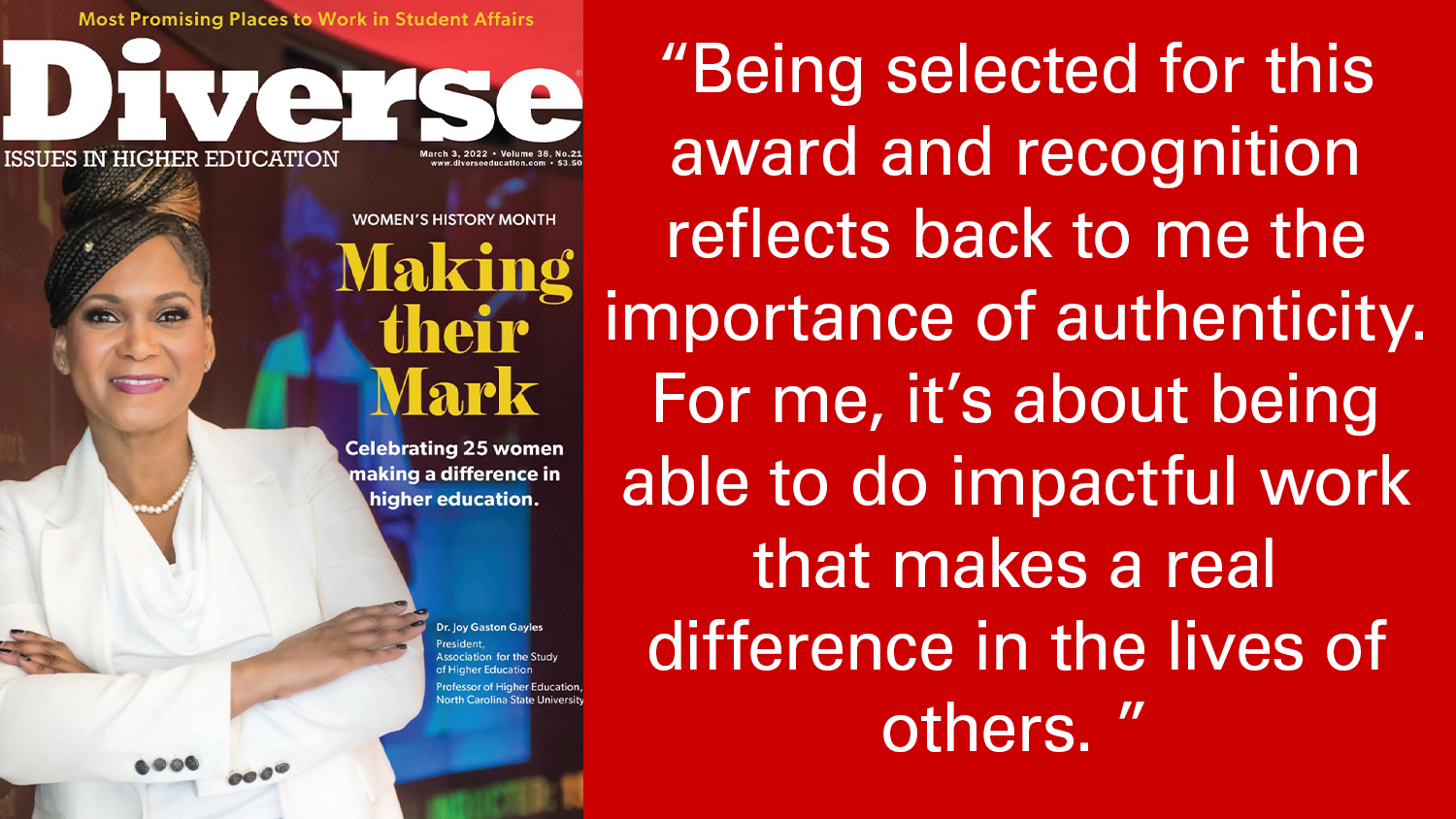Diverse: Issues in Higher Education Recognizes Professor Joy Gaston Gayles Among 25 Leading Women in Higher Education

Joy Gaston Gayles, a professor of higher education and senior advisor for advancing diversity, equity and inclusion in the NC State College of Education, has been recognized as one of 25 leading women in higher education by Diverse: Issues in Higher Education.
Each year the magazine, which focuses on diversity, access and opportunity in higher education, selects a group of leading women in higher education to profile in their March Women’s History Month issue and on their website.
Gayles was selected for this year’s list, in part, because of the impact of her scholarship and work and her role as president of the Association for the Study of Higher Education.
“I was not expecting this, so it truly was a surprise and a meaningful one,” Gayles said. “Being selected for this award and recognition reflects back to me the importance of authenticity. For me, it’s about being able to do impactful work that makes a real difference in the lives of others. It also means staying true to myself and my work and using my platform to serve others while sustaining myself along the way.”
Authenticity, Gayles said, is important because early on she spent a lot of time focused on things she thought she was supposed to do to advance her career. She was trying hard to fit in, she said, but it didn’t always feel right. Once she stopped trying to fit in, however, she became more introspective and was able to figure out what she was passionate about and how she can consistently connect her purpose to the work she engages in.
Her scholarly work over the past two decades has focused on access, equity and success in higher education, particularly examining barriers that student athletes, women and people of color in STEM fields face and how those barriers can be removed to help promote student success.
“I’d like to think that my research and scholarship over the years, particularly on women and underrepresented populations in STEM, has illuminated the ways in which college environments are problematic and what many of the barriers are that impede success for women and people of color,” she said. “I hope my scholarly work will help us think differently and creatively about college environments and how we can dismantle systems and structures within them that are oppressive.”
In addition to her own research, Gayles has been thinking about the type of impact she hopes to have as the newest ASHE president.
Thus far in her role, she has helped to launch a partnership with the National Center for Faculty Development and Diversity (NCFDD) to offer ASHE members an opportunity to participate in a two week writing challenge to make progress on writing conference proposals. She is excited, she said, about the opportunity this affords members to write in community with one another while supporting and encouraging each other and engaging as a scholarly community.
She is also leading the current round of ASHE’s strategic planning initiative, working collaboratively with members to address needs and fulfill the organization’s mission.
“As we continue to grow and thrive as the premier professional organization for the study of postsecondary education, it’s important for us to meet the diverse needs of higher education, and centering equity and justice plays a major role in who we are and will be moving forward,” she said.
In addition to centering equity in her work with ASHE, Gayles said she is also proud of the work she has done with the College of Education community to work toward becoming an anti-racist college.
As part of this work, she collaboratively developed the Courageous Conversations in Community series for students, faculty and staff, which has included discussions on topics including culturally responsive pedagogy, self-care while engaging in anti-racist work, microaggressions and racial gaslighting.
“This work is not easy, but it’s necessary. As we are working to become an anti-racist college, we realize that this is not a place where we will ever really arrive. It’s more like a continuous journey of reflexive praxis, unlearning and engaging in courageous dialogue to better understand and disrupt systemic oppression,” she said.
As she is nationally recognized by Diverse during Women’s History Month, Gayles said she hopes to bring attention to historical patterns of exclusion and racism.
She noted that Black women in academia, like herself, account for less than 2% of professors and an even smaller percentage of Black women in the academy ever achieve the rank of full professor.
“Heritage months like Women’s History Month should not only celebrate the achievements of women, but also bring awareness to issues that women continue to experience. Further, those issues should be contextualized across interlocking social identities that women hold within the context of systemic oppression,” Gayles said. “Not doing so masks nuances at the intersections of systemic oppression for marginalized women. Consequently, instead of dismantling oppression, we end up perpetuating it if we are not careful and critical.”
- Categories:


